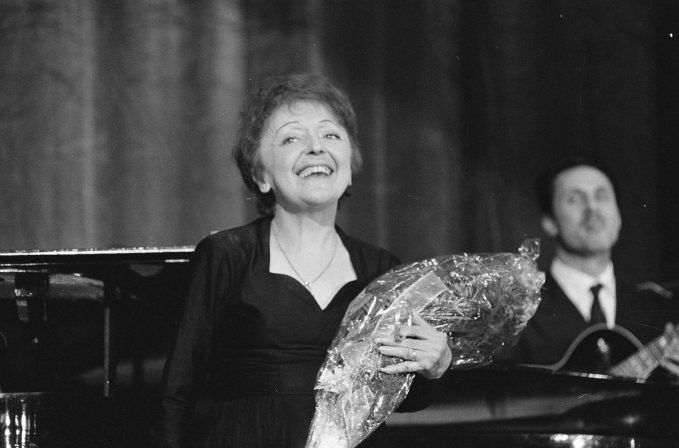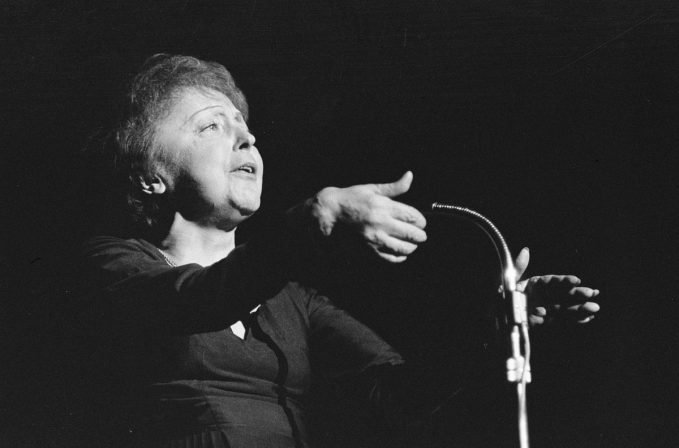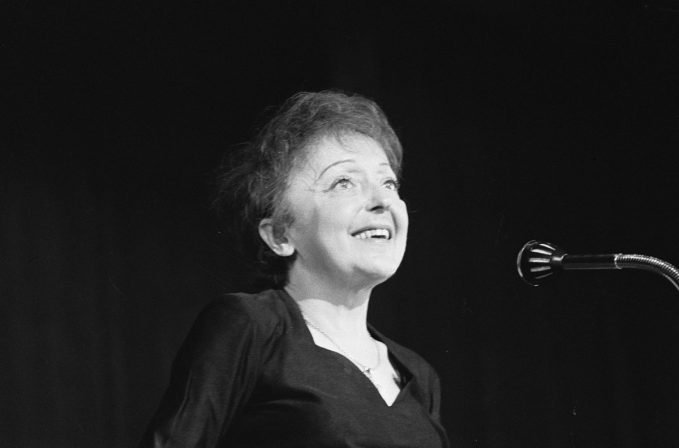French Music and Cinema: Edith Piaf’s songs in English-speaking movies

French music is not the most famous, but everyone has at least heard Edith Piaf’s songs before. If you think you haven’t, but you have seen one of the movies mentioned in this article, then you’ve heard one of her songs without even knowing it.
Édith Giovanna Gassion, known as Edith Piaf (“piaf” being a French slang for sparrow) was a famous French singer born in 1915, whose career started in 1935, and lasted until her premature death in 1963. During her almost 30 year career, she sang hits that cannot be overlooked and that almost every French person knows, even people whose parents weren’t born when she was alive.
- The most famous French song about Ireland: “Les Lacs du Connemara” by Michel Sardou
- Irish songs in French: Renaud and his Molly Malone album
In 2007, a film about her life entitled La Vie en Rose (so titled in the English version, the French original title being La Môme – a slang word for a girl or a kid which was Piaf’s nickname) was released. Marion Cottillard, who portrayed the singer, won the Academy Award for Best Actress for her performance, alongside Didier Lavergne and Jan Archibald who won in the category of Best Makeup.
But this movie and the various other ones telling Edith Piaf’s life aren’t the only occurrences of the singer on the big screen. She herself played in a few movies during her life, but her legacy in cinema went further with her songs being used in several movies, and not only French ones.
La Vie en Rose
With the title that lent its name to her 2007 biopic, this song is probably one of Piaf’s most famous pieces around the world, released in 1947. Literally, the title can be translated as “life in pink”. Piaf sings that she sees life in pink, which is an expression that means being optimistic and happy.
Popularised in the English-speaking world by the Jamaican American model and singer Grace Jones, who released a disco version in 1977, the song has also appeared in a lot of English-speaking movies for more than half a century now.
Among them, we can count very famous performers singing the song in movies directed by famous directors, like Marlene Dietrich in Stage Fright by Alfred Hitchcock in 1950, or more recently Lady Gaga in A Star Is Born by Bradley Cooper in 2018.
It is also played or sung in, among others, The Irishman (2019), Sabrina (1954), X-Men First Class (2011), The Bucket List (2007) and Midnight in Paris (2011). Very often, the instrumental version played is the one by Louis Armstrong, released in 1950.

The song is composed of two long chorus and two short verses and, as one may imagine, it is a typical French love song. The first verse paints an “unchanged portrait of the man to whom I belong” with “a gaze that makes me lower my own, a laugh that is lost on his lips” (“Des yeux qui font baisser les miens, un rire qui se perd sur sa bouche, voilà le portrait sans retouches de l’homme auquel j’appartiens”).
The second verse keeps painting the scene of their passionate love with “nights of love that never end, a great happiness that takes its place” that has the power to erase the pains and bothers, and makes them “happy, happy to die” (“Des nuits d’amour à plus finir, un grand bonheur qui prend sa place, des ennuis, des chagrins s’effacent. Heureux, heureux à en mourir”).
The chorus comes twice in the song and is about their love story, the lovely things he does and how it makes her feel:
“When he takes me in his arms, he talks to me softly, I see the life in pink. He tells me love words, everyday words, and it does something to me. A part of happiness of which I know the cause has entered my heart. It’s him for me, me for him in life, he told me so, he swore to me, for life. And as soon as I catch sight of him, then I feel my heart beating inside of me.”
“Quand il me prend dans ses bras, il me parle tout bas, je vois la vie en rose. Il me dit des mots d’amour, des mots de tous les jours, et ça me fait quelque chose. Il est entré dans mon cœur une part de bonheur dont je connais la cause. C’est lui pour moi, moi pour lui dans la vie, il me l’a dit, l’a juré pour la vie. Et dès que je l’aperçois, alors je sens en moi, mon cœur qui bat”.
Non, je ne regrette rien
The title can be translated “No, I do not regret anything”. This song was famously used exactly 50 years after its 1960 release by Christopher Nolan in Inception. In the movie, the song is played several times and is a signal to tell the characters when they have to switch between one reality and another.
Starring Marion Cottillard three years after her interpretation of Edith Piaf, Hans Zimmer, who composed Inception’s soundtrack, explained that “all the music in the score is subdivisions and multiplications of the tempo of the Edith Piaf track”, his words being reported in an article on The Guardian’s website.
This song also appears in Babe, Pig in the City (1988), Madagascar 3: Europe’s Most Wanted (2012), Intolerable Cruelty (2003) and The Dreamers (2003), among others.
“Non, Je ne Regrette Rien” is a pretty short song with only two chorus and a single verse in the middle. However, this one is not totally a love song, even if its end easily transforms it into one. The global meaning can be interpreted as a liberation from the past to make a new start.

Piaf sings that she doesn’t regret either the good or bad that have been done to her because it is all the same for her (“Non, rien de rien, non, je ne regrette rien, ni le bien qu’on m’a fait, ni le mal, tout ça m’est bien égal”). She tells us that everything is “paid, swept away, forgotten” and that she doesn’t care about the past (“C’est payé, balayé, oublié, je me fous du passé”).
The second verse stays with the same idea of getting rid of the past, especially the bad things that have happened, to start a new life on a new ground:
“I lit up the fire with my memories, my sorrows, my pleasures, I don’t need them anymore. Swept away the loves with their tremolos/quavers, swept away forever, I start over.”
“Avec mes souvenirs, j’ai allumé le feu, mes chagrins, mes plaisirs, je n’ai plus besoin d’eux. Balayé les amours, avec leurs trémolos, balayé pour toujours, je repars à zéro”
Until then, the song doesn’t look like a love song at all. The chorus comes again a second time and then she sings: “because my life, because my joys, today, begin with you” (“car ma vie, car mes joies, aujourd’hui, ça commence avec toi”).
Other Edith Piaf’s songs in movies
On The Bucket List soundtrack we can also find the song “Milord”, released in 1959, in which a girl tells the story of an elegant upper-class man she has a crush on. He doesn’t notice her and is heartbroken by another girl.
In the Bird of Prey’s trailer (2020), you can hear some part of “L’Hymne à l’Amour”, released in 1950. In this song, whose title can be translated “anthem of love” or “ode to love”, Edith Piaf sings about what she could do for love and especially what doesn’t matter as long as she is with her lover. It is known that she wrote this song for her lover, the boxer Marcel Cerdan, and sang it in 1949 right after he died in a plane crash.
In Saving Private Ryan (1998), the song “Tu es Partout” (, with lyrics about heartbreak and a lover who left being missed, can be heard in a scene. “La Foule”, one of Piaf’s most famous songs, still about love and released in 1957, appears in the movie The Iron Orchard.
Edith Piaf is one of the most famous French singers of the 20th century and her songs are used in English-speaking movies. Even if “La Vie en Rose” and “Non, Je ne Regrette Rien” are the most popular, you can hear other songs too. And you, did you know about these songs and their meaning? Let us know in the comment section!